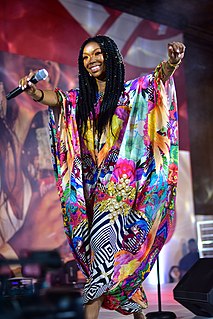A Quote by Sara Zarr
Is it good, bad, or neutral to recognize thematic patterns in your own work? When it comes to recurring themes, I'm of the mind that knowledge is probably not power, at least in terms of the work.
Related Quotes
I've figured out the secret. Your mind is your power; you have to work with your mind and work with your own thoughts about your own life. If you spend so much time thinking, "This industry is male-dominated. It's sexist. It's this. It's that," then that's what the picture will always be. I remember when I was coming up, I didn't have those thoughts. My mom told me I could be whatever I wanted to be and I could be as bright of a star as I was meant to be. So, that's where I put all of my focus and my thought...into what I could do. And I carry that with me now.
You make good work by (among other things) making lots of work that isn't very good, and gradually weeding out the parts that aren't good, the parts that aren't yours. It's called feedback, and it's the most direct route to learning about your own vision. It's also called doing your work. After all, someone has to do your work, and you're the closest person around.
Knowledge is inherent in man; no knowledge comes from outside; it is all inside. We say Newton discovered gravitation. Was it sitting anywhere waiting for him? It was in his own mind; the time came and he found it out. All knowledge that the world has ever received comes from the mind; the infinite library of the universe is in our own mind. The external world is simply the suggestion, the occasion, which sets you to study your own mind.
Yeah, it's odd when you look back at your own work. Some filmmakers don't look back at their work at all. I look at my work a lot, actually. I feel like I learned something while looking at stuff I've done in terms of what I'm going to do in the future, mistakes I've made and things at work or what have you.





































